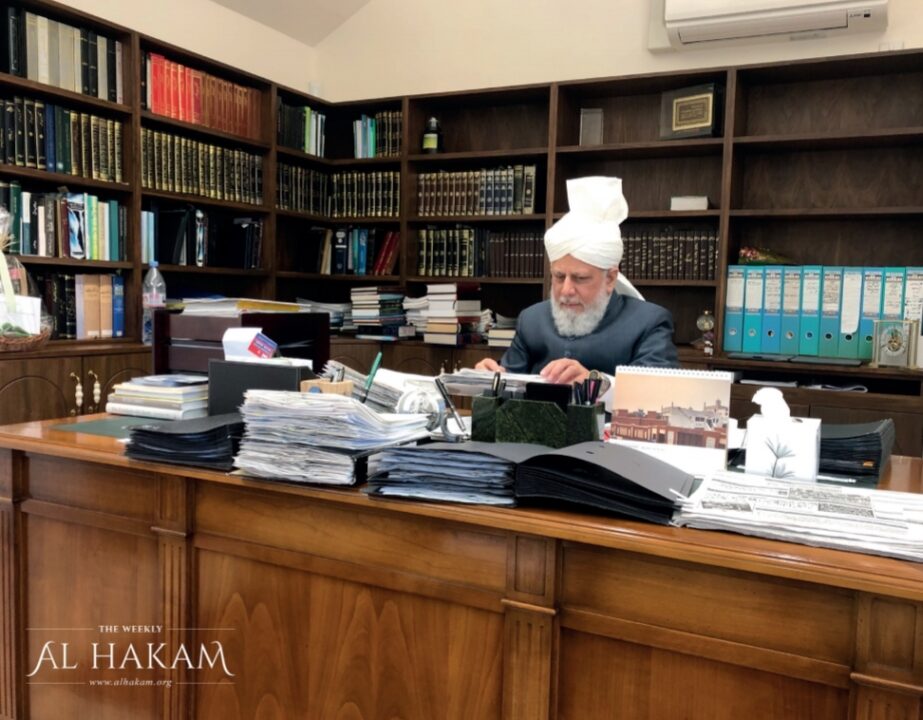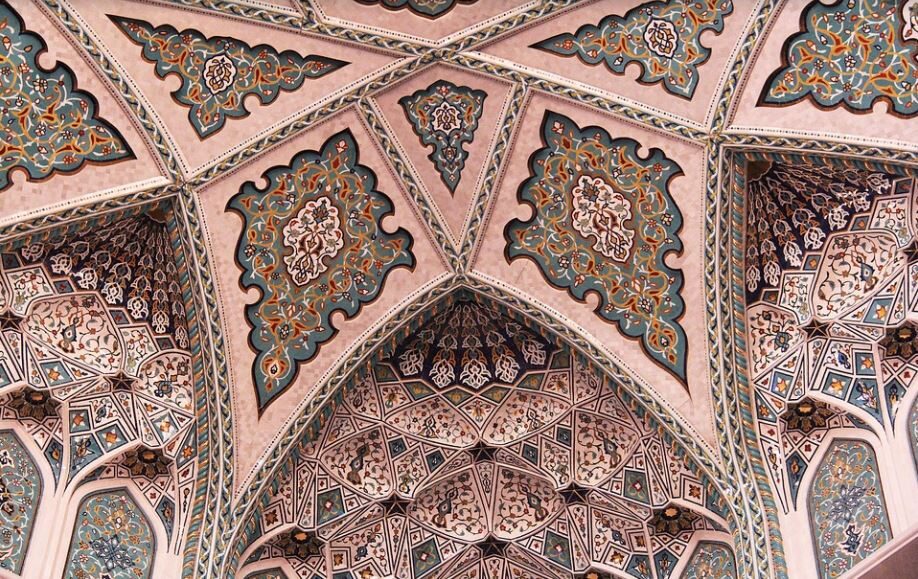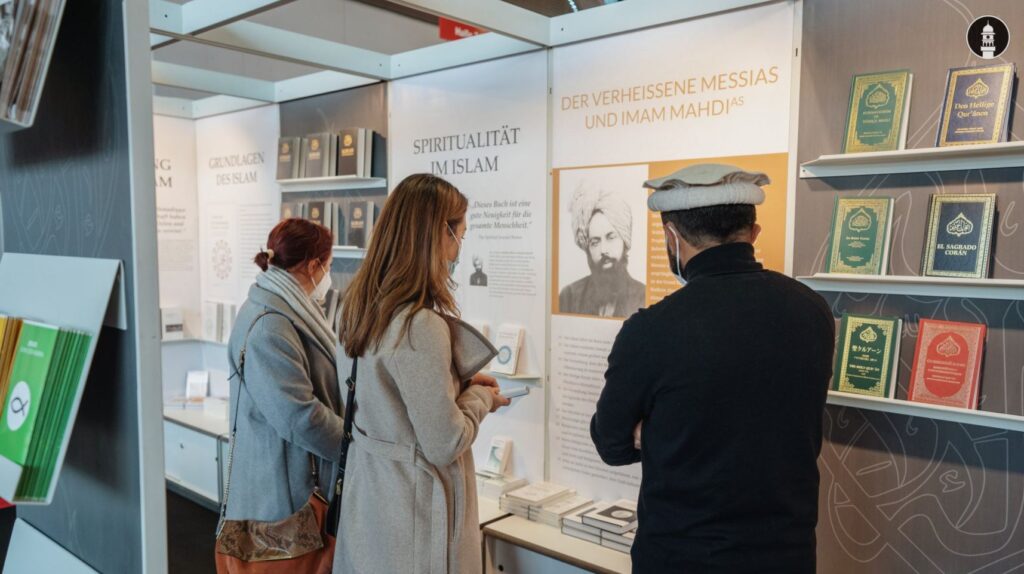Guidance regarding basic Islamic issues – which Hazrat Amirul Momineen, Khalifatul Masih Vaa has given on various occasions in his written correspondence and during MTA programmes – is being officially published below for everyone’s benefit

Wali
Nazarat-e-Islah-o-Irshad Rishta Nata asked Hazrat Amirul Momineen, Khalifatul Masih Vaa about the appointment of a girl’s sister’s husband as the wali for her nikah.
Huzooraa, in a letter dated 30 August 2020, gave the following instructions:
“In the absence of a girl’s father or brother at her nikah, the paternal male relative [usbah], who is closest to her in terms of the degree of kindred, will be her wali, provided that he has the best interests of the girl at heart in every respect, as the word wali [guardian] itself demands.
“However, if nobody from the girl’s usbah is available, then the Khalifatul Masih shall be her wali. The wakil [attorney] for the nikah of such a girl shall be appointed by the Nizam-e-Jamaat and that is the way of Jamaat-e-Ahmadiyya.”

Conditional talaq
The nazim of Dar-ul-Ifta submitted a report to Hazrat Amirul Momineen, Khalifatul Masih Vaa about the conditional or suspended divorce [al-talaq al-mu‘allaq].
While commenting on the report, Huzooraa, in a letter dated 25 September 2020, stated:
“In my opinion, the instructions of the Promised Messiahas and Hazrat Musleh-e-Maudra regarding the conditional divorce are very clear and, in light of these references, it has been established that a conditional talaq would indeed become effective upon the fulfilment of the set condition.”
The instructions of the Promised Messiahas and Hazrat Musleh-e-Maudra, mentioned in Huzoor’saa letter, are being reproduced below for the benefit of the readers. (Editor)
The Promised Messiahas said regarding conditional talaq:
“If there is a condition that if such and such happens then one would be considered to have issued talaq [divorce] and if that condition is actually met, then that talaq would become effective indeed. For example, if a person says that if he ate such and such fruit then he would be considered to have issued talaq, if he then indeed ate such fruit, the divorce would become effective.” (Badr, Vol. 2, dated 12 June 1903, p. 162)
“The Promised Messiahas said that the belief of Maulvi [Muhammad Hussain Batalvi] Sahib that hadith took precedence over the Holy Quran was by no means correct or appropriate.
“Respected audience! It is worth noting that the Holy Quran is ‘the recited revelation’ [al-Wahi al-Matluw] and this Majestic Word was collected in its entirety during the lifetime of the Holy Prophetsa, and it was thus the Word of God. Conversely, the ahadith had no such arrangement, nor were they compiled during the time of the Holy Prophetsa and they do not have the same rank and status as the Noble Quran because they have reached us through a chain of narrators. [Given all this] if a person swears saying ‘Every letter of the Holy Quran is the Word of God and if it is not the Word of God, then I should be considered to have issued talaq [divorce] to my wife’, then his wife would not be considered to have been legally divorced. [However] a person who swears with regard to hadith by saying, ‘Every letter and every word of the ahadithis the same as that which was uttered by the tongue of the Messengersa of Allah, and if that is not the case, then I should be considered to have issued talaq to my wife’, then his wife would indeed be considered to have been legally divorced without any iota of doubt.
“This is a summary of the spoken words of the Promised Messiahas.” (Tazkirat-ul-Mahdi, by Hazrat Pir Siraj-ul-Haq Nu‘manira, p. 161, published in June 1915)
Hazrat Musleh-e-Maudra said in this regard:
“Someone wrote to his wife, saying, ‘If I ever called you to this certain house or you went there yourself, then I shall be considered to have issued a talaq to you.’ However, now he wants to invite his wife to that certain house. It was replied to him that one talaq would become effective if [his wife] went to that house but he could return [ruju‘] to her immediately without a new nikah. However, if the stipulated period [for ruju‘] passed, then he could only return [ruju‘] to her after a [new] nikah.” (Al Fazl Qadian, Vol. 2, No. 113, dated 14 March 1915, p. 2)
Nafs, rooh and Eid sermons
Someone asked Hazrat Khalifatul Masih Vaa whether nafs and rooh were the same. They also wrote about the hadith about Eid sermons, recorded in Sunan al-Daraqutni, wherein the Holy Prophetsa said after an Eid prayer that he was going to deliver the Eid sermon and that whoever wished to stay, could stay and whoever wished to leave, could leave. The person asked whether this hadith was authentic.
Huzooraa, in his letter dated 20 October 2020, granted the following reply:
“The words rooh and nafs appear in various places in the Holy Quran carrying different meanings. The word rooh denotes the Word of God, angels, Gabrielas, prophets and that soul which appears in the human body at a certain time by divine command. The word nafs, on the other hand, is used for life, breath, a person, a being with a soul, heart, a being or consciousness etc.
“Linguistically, the term rooh is used to denote that thing by means of which the souls [nufoos] remain alive i.e. life. Likewise, the term rooh is also used for breath, revelation and inspiration, Gabriel, the matter of prophethood, and the judgment and command of God Almighty. Moreover, as opposed to the body, the thing that distinguishes animals from other things and distinguishes human beings from animals and elevates humans to be in communion with God is also termed as rooh.
“Linguistically, the term nafs, on the other hand, denotes body, person, soul, human being which is made up of body and soul, greatness, honour, courage, intention, ‘itself’ and opinion etc.
“A study of the Holy Quran and the ahadith also reveals a difference between the nafs and the rooh which is that Allah the Exalted has granted man the power to control the nafs, to reform it and to change it to a certain extent. Hence, the Holy Quran has described three states of the nafs (ammarah, lawwamah and mutma‘innah). Moreover, according to a hadith, ‘The strong person is not one who is good at wrestling, but the strong person is one who controls his or her nafs during a fit of rage.’ The matter of the soul [rooh], on the other hand, is exclusively under the control of Allah the Exalted and He has not given man the power over it as He states:
قُلِ الرُّوۡحُ مِنۡ اَمۡرِ رَبِّيۡ وَ مَاۤ اُوۡتِيۡتُمۡ مِّنَ الۡعِلۡمِ اِلَّا قَلِيۡلًا
“‘Say, “The soul is by the command of my Lord [; and of the knowledge thereof you have been given but a little.]”’ (Surah Bani Israil, Ch. 17: V. 86)
“Moreover, Islam does not approve of asking many questions about the soul.
“The Promised Messiahas, while commenting on the following verse of Surah al-Naba in his Arabic book Nur-ul-Haq, has, has explained the meaning of rooh and has also mentioned the nafs:
يَوۡمَ يَقُوۡمُ الرُّوۡحُ وَ الۡمَلٰٓئِكَةُ صَفًّا ؕ٭ۙ لَّا يَتَكَلَّمُوۡنَ اِلَّا مَنۡ اَذِنَ لَهُ الرَّحۡمٰنُ وَ قَالَ صَوَابًا
“(Surah an-Naba, Ch. 78: V. 39)
“His commentary reveals that these are two different things. Moreover, the following guidance by the Promised Messiahas also abundantly clarifies the difference between the two. The Promised Messiahas says:
“‘It has been inspired upon my heart that the word al-rooh in this verse refers to the group of messengers, prophets and muhaddathoon, upon whom the Holy Spirit is poured and they communicate with God Almighty […] Moreover, God has mentioned His prophets by the word al-rooh, that is, by a word which signifies separation from the body. He did this in order to point out that the purified people were absolutely engrossed in the Will of God in their worldly lives in terms of all their faculties. They broke away from their nufoos as the soul breaks away from the body. Neither their nafs, nor the desires of that nafs remained. They spoke only when called through the Holy Spirit, not of their own will. It was as if they themselves had become the Holy Spirit, with whom the nafs does not mix. Moreover, know that prophets are like one soul […] They completely broke away from their nafs and their movement and their comfort and their desires and their emotions and there was nothing left in them except the Holy Spirit. And they broke away from all these things and went in the company of God. So, God desired to manifest the station of their uniqueness and holiness through this verse and how they are far removed from the impurities of the body and the nafs. Hence, he named them al-rooh meaning ‘Holy Spirit’ so that this word may reveal the greatness of their glory and the purity of their heart. And soon they shall be called upon on the Day of Resurrection by this title, so that Allah may reveal to the people their station of separation [inqita‘], and so that He may reveal the difference between the bad men and the pure ones. By God, that is the truth. (Nur-ul-Haq I [Arabic-Urdu], pp. 73-74, first edition)
“The hadith regarding leave from the Eid sermon that you have mentioned in your letter with reference to Daraqutni has also been narrated in Sunan Abi Dawood.
“It is correct that the Holy Prophetsa has not emphasised the listening of the Eid sermon as much as he has emphasised the attending of the Friday sermon and listening to it with complete silence. Based on this, fuqaha and other scholars have declared the Eid sermon a sunnah and mustahab [i.e. a desired action as practised by the Holy Prophetsa].
“However, alongside this, one should also remember that the Holy Prophetsa has declared the attending of the Eid prayers and joining in the supplications of the Muslims, a blessed act of virtue. He emphasised it to the extent that he instructed that a woman who does not have her own scarf, should borrow it from one of her sisters to attend the Eid prayers. Moreover, he emphasised attending the Eid prayer for menstruating women with the instruction that they should join in the dua while staying out of the prayer area.”

Gaming bets and celebrating birthdays
The nazim of Dar-ul-Qaza Qadian wrote a letter to Hazrat Amirul Momineen, Khalifatul Masih Vaa and asked about the Islamic ruling on playing online games by betting money through various mobile phone apps, and on celebrating the birthdays of young children and congratulating each other on social media.
Huzooraa, in his letter dated 20 October 2020, granted the following reply:
“These two questions have nothing to do with qaza. However, I am answering them for your knowledge that risking money in games in a manner that would incur a loss of one’s money if one loses that game or one would gain some money in case of winning the game, is called gambling which has been categorically declared haram [forbidden] by Islam. Whether the game is played in person, or by way of a lottery, or by risking money online through various apps, it is called gambling in all cases which is prohibited.
“There is nothing wrong with celebrating children’s birthdays and cutting cakes within one’s home with the family members in a way that does not involve any kind of innovation [bid‘ah], or extravagance, or any un-Islamic acts. However, at the same time, one should also give some charity in the way of Allah and the children should be instructed to especially offer nawafil on this day to give thanks to Allah the Exalted for giving them a healthy life and to beseech His grace [fazl] for the next life.”
Tarbiyat of Ahmadi girls
During a virtual mulaqat of the national majlis-e-amila of Lajna Imaillah Australia with Hazrat Khalifatul Masih Vaa, which was held on 19 December 2020, Huzooraa stated regarding the tarbiyat of Nasirat-ul-Ahmadiyya:
“You should advise girls from an early age that they should dress modestly. When they grow older and enter Lajna, they ought to know that alongside wearing modest clothing, it is Allah the Exalted Who has commanded them in the Holy Quran to wear the hijab too. If you provide them such training when they are young, it is then that they will wear modest clothing once they become nasirat of ma‘yar-e-kabir and then enter Lajna. Advise them from childhood that although they are still young, the Holy Prophetsa has stated that modesty is part of faith. Therefore, they ought to dress modestly. Then, when they grow older, alongside modest clothing, they ought to wear the hijab too. When one wears the hijab, it naturally has an effect. It can prevent many ills, such as socialising with men or forging friendships with them. It naturally develops awareness among the girls who go to universities and colleges that have to uphold the sanctity of hijab. Therefore, if you ensure good moral training of the girls when they are still young and nasirat, then all the problems faced by Lajna will be resolved and there will be no complaints.
“The task [of the moral training of] nasirat is very significant. If you ensure the moral training of nasirat from now, by the time the girls go to colleges and universities, they would know their identity and should know what Ahmadiyyat is. The girls are taught the Quran and the hadith, but many not do not even know the reason for the coming of the Promised Messiahas. [Many do not know] if we have the Quran and the hadith and also the final Messengersa, then what was the need for the Promised Messiahas. They should know these things from a young age. What was the need for the Promised Messiahas, and why did he come? This was a prophecy of the Holy Prophetsa, and he came to fulfil it. They should learn these things from childhood. It was after learning these fundamental issues that they will be able to progress. Otherwise, people eventually come to learn about the major issues anyway. Teach them the basic matters. They should know what their beliefs are, why they are Ahmadis, and what their responsibilities are. Once you do this, you will see that your next generation of Lajna will be much better than the current generation.”
Team building and leadership skills
During the same virtual mulaqat [of the national majlis-e-amila of Lajna Imaillah Australia with Hazrat Amirul Momineen, Khalifatul Masih Vaa, which was held on 19 December 2020], while answering a question, Huzooraa stated with regard to working as a team and the significance of training others:
“To simply work or even work well on your own is not representative of genuine achievement or excellence. Of course, if you work well yourself and submit excellent reports, this is a personal quality of yours and is a good thing. However, if you have not developed a team alongside this or have not trained your second line to continue the work after you, then it means that you have actually not achieved anything at all. The real aim is not to work independently; rather, the objective is to build a team and a second line so that when you are older, and I am not saying that you are already old, but when you become older, then at least there will be others who will be able to assume the duties and carry on the work. Therefore, all the Lajna secretaries who are sitting here should not think that they are only 35, 40, 45, or 50 years of age. They should prepare a second line regardless [of their age]. Moreover, the sadr of Lajna should instil this spirit of work amongst all the different majalis in her country and should advise their secretaries and presidents to do the same, so that you continue to find members who can carry on the work and also understand the system. When someone is entrusted with any task, they are able to fulfil it one way or the other. You have the various constitutions and the rules & regulations [with the help of which] you will be able to accomplish the tasks. That is not the issue. However, if one is already part of the system, then one will be able to discharge that duty or that responsibility in a better way whenever it is entrusted to them.”

The intention behind tabligh
[During the same virtual mulaqat of the national majlis-e-amila of Lajna Imaillah Australia with Hazrat Amirul Momineen, Khalifatul Masih Vaa, which was held on 19 December 2020], while answering a question by the secretary for tabligh, Huzooraa outlined the philosophy behind spreading the message of Islam in the world and stated:
“The purpose of achieving bai‘ats is not so that you can include it in your reports. The reason you are to carry out tabligh is that we have compassion for people and want to bring them closer to Allah the Exalted. That compassion requires us to convey to them the true message of Islam. Furthermore, it requires us to improve our own conditions and to develop a personal relationship with Allah the Exalted. The secretary for tabligh should have a personal relationship with Allah the Exalted. May Allah the Exalted enable you to achieve this.”
Attendance at Lajna meetings
During the same virtual mulaqat [of the national majlis-e-amila of Lajna Imaillah Australia with Hazrat Amirul Momineen, Khalifatul Masih Vaa], which was held on 19 December 2020, while answering a question on how one could improve the attendance at meetings, Huzooraa said:
“You should continue to remind and make them understand with love. Instead of exercising your authority as an officeholder, be like their elder sister or their younger sister or their mother and continue to remind them. They will eventually start attending. Our duty is to remind them continuously. You should also include interesting segments in your meetings and involve those who do not attend; ask them, for example, to deliver a talk and you will see that they will attend.”
(Compiled by Zaheer Ahmad Khan, Head of Records Dept, Private Secretariat, London. Translated by Al Hakam)

